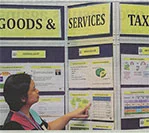GENERALLY speaking, governments are not very good at communicating with electorates. More advanced democracies try, of course, and some even make the passing grade. Most, though, fall well short of the mark.
This seems surprising, since politicians are supposed to be great communicators.
This is not always true, but the oratory skills that win elections are an entirely different matter from those needed to govern effectively.
One has only to count the number of times nonsensical statements are made and proverbial feet put in mouths to see this. Alternative media and opposition politicians do not help matters by quoting incumbents out of context 100 per cent of the time or so it seems.
If politicians do not really know their stuff -and who can blame them, given their backgrounds -one would hope their officials do. Often, however, those who can do more than mumble dry technicalities are prevented from doing so by their higher-ups.
Recognising this, a great deal of money these days is spent on buying in outside consultants to craft better messages.
This, then, raises the question as to whether what matters is the message or also the messenger.
Communication theory and practice say that it is both. Communication is more than just passing information back and forth. It is not just what is said but what is heard.
Speaking without listening is one of the chief reasons why communication fails. Psychologists tell us that much of communication is nonverbal anyway.
Malaysian society, like those in most countries, is diverse, meaning there are multiple interests, worldviews and motivations.
Some citizens are civic, orderly and law abiding, others not. Some are intelligent, thoughtful and rational, others most definitely not. Speaking to such different com munities can be a difficult and messy affair at the best of times.
But this is exactly what is expected if governments are to be responsive and responsible.
Saying the same thing to all segments of society is not terribly helpful although still much better than saying different and contradictory things. This is especially true when an issue, for example, the soon-to-be-imposed Goods and Services Tax (GST), is controversial. My personal survey indicates that there is confusion, resentment, obstinacy and opportunism.
Aldi contributes his time to a non-profit entity and is completely bewildered. His organisation survives on public donations but also supplies services to the needy below market cost. It occasionally sells goods as well to raise funds. The advice he has gotten has been too general to be able to allay fears. He is currently studying the matter by asking others and not expensive accountants.
Alicia works for a private education institution. Her employer has told staff that costs will increase following the introduction of GST and, therefore, expenses and salary increases will have to be capped. She does not know what GST is about but understands the need to introduce it. She is obviously bitter about being told that her meagre pay packet will not rise much after.
A member of the public taking a closer look at posters giving details on the Good and Services Tax at a government roadshow in Kota Kinabalu on Jan 22. More needs to be done to effectively communicate the benefits of GST. Pic by Izhari Ariffin
Ali is a trader who sells clothing like headscarves and shawls from carts that he operates in three shopping centres. Business is good and his total turnover well exceeds the GST registration threshold. He smilingly refuses to do so, however, believing that he will not be caught or will be let off if he is. He tells me that none of the other cart operators where he operates have registered either.
Alf works for an industrial trading concern. Her company, which has registered to collect GST, has dealerships and operates on fixed margins. Most of its customers are non-English speaking small and medium enterprises. They have told her that they intend to just mark-up prices by higher than the standard rate and pass it down to end users. For them, it is just another transaction.
If these cases are at all representative of many others, GST implementation will not go as smoothly as hoped. How does the government communicate with these constituencies -apart, that is, from threatening to fine and jail offenders? How are apprehensions allayed and stakeholders cajoled and persuaded?
Not everyone will comply with the letter of the law of course. But is this because of the absence of real communication efforts or despite it? Communication is a two-way affair. Cartoons are trivial and presentations can only go so far.
What is needed are more ground-level interactions that encourage, persuade and inform.
Article by Dato’ Steven Wong which appeared in New Straits Times, 3 February 2015.





